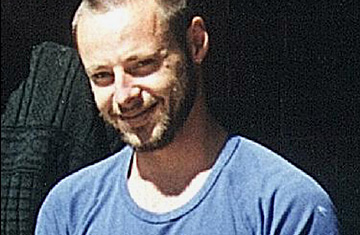
Australian David Hicks, a detainee at the Guantanamo Bay U.S. base in Cuba.
On Saturday morning, shortly after 8 a.m. local time, the man called "the Aussie Taliban" walked free from Adelaide's Yatala Prison in South Australia. Having served nine months for supporting al-Qaeda terrorists, David Matthew Hicks, 32, in jeans and a green polo shirt, issued a brief statement through his lawyer, David McLeod: "I had hoped to be able to speak to the media, but I'm just not strong enough. It's as simple as that."
Since Hicks was seized by a group of Northern Alliance fighters at a checkpoint in northern Afghanistan two months after the Sept. 11 terrorist attacks, he has been the subject of relentless speculation as to whether he was a terrorist true believer or just a thrill-seeking adventurer who went astray. Yesterday, smiling and looking stocky and confident, Hicks was driven away in a two-car convoy while his lawyer spoke on his behalf: "First and foremost I recognize the full depth of gratitude for getting me home. I will not forget or let you down."
Outside the prison, Hicks' father, Terry Hicks, told TIME that his son has never had the chance to tell the real story of what happened to him and may never want to. "Everybody wants to know if he will write a book. We don't know," he said. "I keep saying he may change his mind, but he's said no." Under an agreement signed with U.S. authorities, David Hicks is prevented from profiting from any book deal and is subject to a 12-month gag order, which expires in March 2008. "The whole story needs to be told properly," says Stephen Kenny, the Australian lawyer who was one of the first to take up Hicks' case. "This can happen, and it has happened to other Australians."
Hicks' bizarre journey began in November 1999, when the former kangaroo skinner and roustabout boarded a plane to Pakistan and made contact with the terrorist group Lashkar-i-Tayyba. Known to fellow recruits as Mohammed Dawood or Abu Muslim al Austraili, Hicks entered the Lashkar-i-Tayyba training system, learned how to use a range of weapons and toured the front lines in Kashmir — the disputed territory over which Pakistan wages its long-running battle with India — claiming in letters home that he had fired weapons across the border. He later moved to Afghanistan, where he underwent training at al-Qaeda camps, learned surveillance techniques and met Osama bin Laden.
After the Sept. 11 attacks, Hicks was guarding a Taliban tank in Kandahar in southern Afghanistan, before heading north to the front lines near Kunduz. He was then captured and handed over to U.S. troops for a fee, and transferred to the Guantánamo Bay Prison in Cuba, where he was detained for five years without charge — and where, his supporters say, he was beaten and tortured.
Meanwhile, his Australian-based father waged a campaign for his release. Backed by human-rights lawyers, his campaign prompted the Australian government to pressure U.S. authorities to charge his son; in March 2007 David Hicks became the first Guantánamo detainee to be convicted under the U.S. Military Commissions Act of 2006. Hicks pleaded guilty to providing material support for terrorism, and was sentenced to seven years (reduced to nine months for time served), but gave no insight into how a young father of two ended up in the inner sanctum of al-Qaeda's training camps in Afghanistan. Nor did his plea reveal what Hicks underwent or said while at Gitmo.
Australian authorities still consider Hicks a threat today; earlier this month the Australian Federal Police (AFP) obtained a control order to ensure that he is monitored. Using letters written to his parents while he was in Afghanistan, the AFP describes Hicks as a devotee of al-Qaeda, who once wrote that Osama bin Laden was "a lovely brother" and declared, "Western society is controlled by the Jews." Under the control order, Hicks must report to a police station three times a week, use an AFP-approved SIM card in any mobile phone, and must not leave Australia.
But the basis of the AFP's concerns, according to Terry Hicks, are just his son's "storytelling," and do not reflect the real David. "Nothing has been proven for what he's supposed to have done," Terry said on Saturday. Though Terry had once hinted that his son might make an apology to Australia, he now says David feels no need to do so: "He's done his time, and it's time for him to settle down."
Terry's immediate concern is the pressure his son will face now that he has been released. "It's been an extraordinarily long time for him, and we are not sure how he's going to cope," he said. "But once he's out of the system he will be checked out and looked at and have medical, mental and physical checks." He paused, reflecting on the strain of the past few years. "Probably the mental checks will go on for quite a while," he said.
